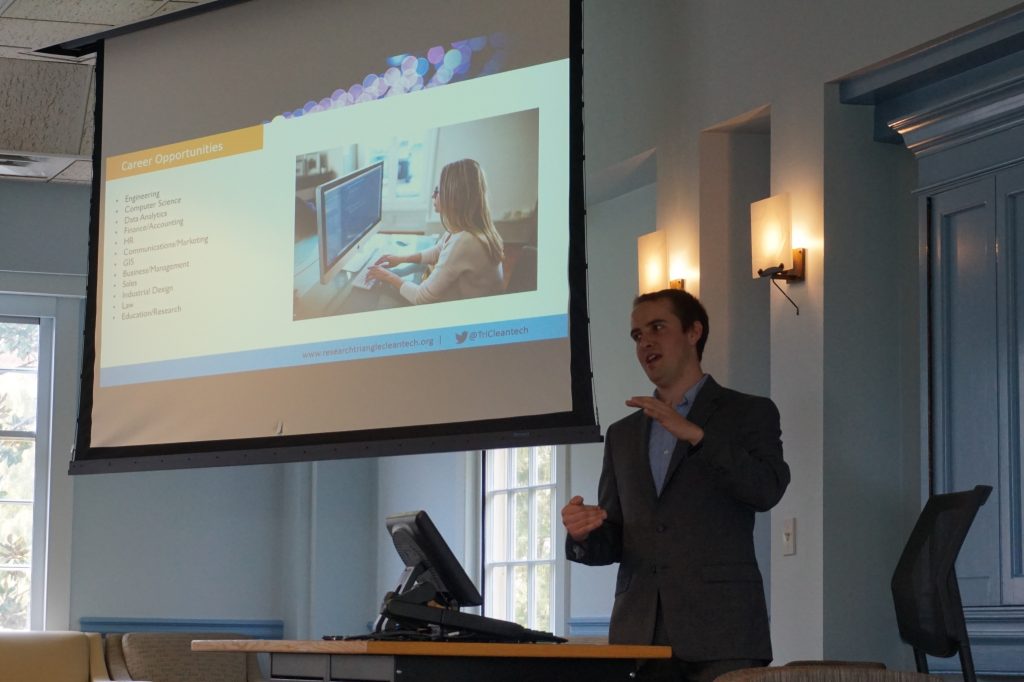Research Triangle Cleantech Cluster second fastest growing cluster in the world, says Abele
December 3, 2017
By Cinnamon Moore
Earlier this semester, UNC Institute for the Environment hosted a Clean Tech Luncheon seminar with speaker Matt Abele, communications and events manager at the Research Triangle Cleantech Cluster (RTCC).
The innovative organization was established more than five years ago and has amassed more than 350 clean tech companies in its membership. Their goal, Matt said, is to connect the companies already in the Triangle, bring new companies to the area and build up what they call the “triple helix”: collaboration among government, academia and industry.
Collaboration from all three facets of the “triple helix” brings together research from institutions and investments from the government to effectively push forward the clean technology revolution.
RTCC was established to give this collective group of companies a voice. Instead of attempting to individually push the initiative forward, they decided to fund an organization that would fuse their voices and more effectively assert their ambitions for more sustainable living.
Now, RTCC consists of co-operatives, energy companies, communication firms, law firms, developers and the U.S. EPA. The directors of RTCC include representation from companies like ABB, SAS and Itron.
“The future rests on connected infrastructure,” Abele said. “We’re calling it the internet of things.”
Even companies like Cisco, with no apparent ties to clean technology are joining RTCC’s forces because of their agreement and belief in this connected industry.
Citing studies from RTI, Abele said that their organization has been a figurehead in bringing in more than 12,500 clean tech jobs just in the Triangle region—being the second fastest growing clean tech cluster in the world, RTCC is making huge waves in the development of the Triangle region.
“Money is pouring into the region, which is helping companies continue to grow and create vibrant entrepreneurial growth,” Abele said.
The growth of the Triangle’s clean technology sector can be attributed to companies’ needs for talented individuals to run them. Having three prestigious universities in close proximity to each other made the area an attractive fit for the companies to put down roots. Not to mention, the real estate is relatively cheap compared to places like New York City, the Raleigh-Durham Airport is convenient and the quality of life is exceptional, Abele explained.
The projects these companies are working on are far-reaching and groundbreaking.
“Think smart street lighting,” Abele said.
These streetlights can alert energy companies automatically when lights go out or when gunshots are audible in close proximity.
Other projects include autonomous cars, drones that help measure building efficiency and batteries the size of tractor-trailers that can store output from solar energy panels.
“We’ve had awesome examples of industry, government and academic leadership over the last few years,” Abele said.
With all of these innovations comes the need for employees. Because the companies are so diverse, jobs in the clean tech industry are equally as wide-open. These companies are looking for individuals from support staff to designers and producers.
One of the goals of RTCC is to fulfill the organizations’ initial goal to connect recently graduated students to clean tech organizations to discuss job opportunities.
“One of the biggest takeaways I want to leave you with is don’t limit yourself to just a few certain sort of positions—there are so many opportunities out there,” Abele said.
